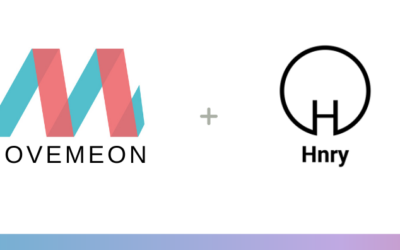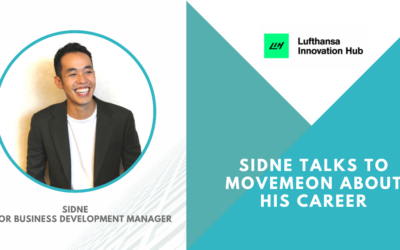Cengiz Rahmioglu, Managing Director at Burning Rose shares his career journey and his experience using Movemeon.com
Interested in working at Deliveroo? Click here to view live roles
—
1. Could you talk us through your career – how did you go from a small boutique to BCG, and from there to Leon and Deliveroo?
I didn’t get into consulting to be a lifelong consultant, but I really enjoyed the experience. I originally started my career at Marakon, which is on the boutique side. So, when I was offered the role at BCG, I had to ask myself, can I actually see myself thriving in the corporate world? I once worked for a regular bank – compared to that, BCG is more agile and entrepreneurial, so I did think the move made sense. In the end, it was quite fascinating in many ways, but once you jump onto the client-side you realize how slow these organizations can be, and you have to play a lot of the political games, and I didn’t really see myself enjoying that.

Before BCG, I was at Reckitt Benckiser, in a role I very much enjoyed as it was very hands-on. You were on the ground, working with country and regional managers. They would literally ship you off to America for six months, working on any problem that they had during that period. That was essentially when I realized that I actually really liked being on the client site and getting my hands dirty, and working on all things rather than just being a PowerPoint and Excel monkey, which is often what the consulting day-to-day ended up being like. But at the same time, I was actually dating somebody in London, and I didn’t want to spend all my life on the road. That’s when, at just the right moment, I got headhunted by BCG, to go back to the consulting side in London.

What I realized as soon as I jumped back into consulting was that it was in some ways the biggest mistake I could have made. After getting a taste of the hands-on experience of the client side, I really didn’t like just advising on multiple projects at the same time, and not having full end-to-end control over the results. For methe big realization came on my 25th birthday (I started university earlier than normal which is why the numbers may sound a bit funny). I got invited to a workshop at Escape the city, which was designed to help you find your passion, and make the transition to a startup.
As part of the Escape the city workshop, they were at the time experimenting with this notion of a startup tribe: people who wanted to start their own businesses, join a scaleup, or make the transition from a traditional consulting or banking style job to non-traditional, startup jobs. That’s essentially when the light literally lit in my head saying, “Okay, this doesn’t have to be my life! How do I actually go about finding a role that may not exist right now?” The kinds of companies I was becoming interested in are often not at the scale where they are be looking to hire highly paid consultants. There are some consumer technology exceptions, but these things generally don’t happen by themselves. So the way I find myself getting into Leon, which is where I eventually ended up, was actually a very old school way.
One of the exercises we went through as part of the startup tribe was thinking about the three companies that we would have loved to work for, and then just reaching out to them. I thought about three companies that I really liked and Leon was actually number one on the list. I’m not even joking about this one. It was the first place I went for lunch when I moved to London from the United States, and I remember saying to my sister, “Wouldn’t it be great to work for these guys? They’re definitely on to something, how do you bring this to more people? Wouldn’t it be great to own something like this ourselves?” So, I literally dropped a cold email to the founder.

I think I was in the right place at the right time. Five, six hours after I sent the cold email, pretty much in the middle of a meeting, my phone rang: “I’m looking at your CV. For some reason, I like it a lot, and I would like you to come and meet me.” I literally stopped whatever I was doing on my project, which was based in France actually. I knew I really needed to do this. So, long story short, at the time their big complaint was one shared by a lot of startups – you have a lot of doers and executors, but you don’t necessarily have a lot of people who are doing the thinking about what comes next, and how to essentially put the systems and processes in place to scale an organization. They needed someone who had the hunger to learn and grow with the organization. They asked me to think about three or four projects that we should work on, and present these within the next day. One of the three would then become my test project, which I would also present to the board after 6 weeks. The board would then decide whether I was going to be hired and my salary.
That’s essentially what we did, as crazy as that sounds. My first project was entering the US and Japan for Leon. The board said this was the best thing they had seen. They asked what I wanted, and I was in it for the learning experience, but I did also want to get what my work was worth. That’s how I found myself at Leon. Originally, my remit was quite focused on what I call special projects; anything that’s beyond the scope of running the day-to-day operations. Slowly I started working in the corporate team, on franchising strategy, until eventually I was bridging every single discussion, ranging from sitting in the food meetings and writing the food plan to thinking about opening our first regional city line. I suddenly started having a strategy function, taking care of all planning actions, as well as working on all the projects and being Chief of Staff to the CEO. I thought this was probably the best thing I could do coming out of consulting to give me a 360 view on how a restaurant brand works, and how you go from being a small London-based chain to hopefully being a multinational restaurant.
This journey was great for around 4 years, and I felt like each year there were new challenges coming my way. We had a really interesting chat with the CEO and Co-founder after about 4 years – I was saying “Okay, looking into 2019, what’s in it for me?” And what he said at the time was “The only job that I could give you that would satisfy you is my job. But Leon is my baby. You are an amazing number two; you probably need to think about what your journey should be going forward; whether you want to create your own thing. I will support you to do whatever your next step may be.”

I’ve thought about that quite a lot. I decided to take a few months off just to think and reflect. I went to the US for a month, since I was also quite involved with the launch there. At the same time, I was thinking about starting my own thing, when I was approached by Deliveroo. That was quite an interesting business as well because delivery really became my pet project at Leon – I was really interested in the delivery consumer technology space and how the definition of restaurants is going to change in the future. I had relationships with first Deliveroo then UberEATS, as the day-to-day contact. So Deliveroo basically said to me, “We really don’t understand how restaurants work, how restaurants think, what they need from us. How do we become their strategic partner of choice in terms of the services that we need to build?” I knew I wanted to work in restaurants. And I really did think that the restaurant landscape was changing. So, I felt it would be a great strategy to get an insider view on what the likes of Deliveroo look and feel like. I think if anything, for little restaurants they’re quite scary because they don’t really know what their agenda is.
I was at Deliveroo for 18 months and it was fascinating in many ways; it was even scrappier than Leon. They had a lot of funding and were really going through the growing pains. In the end, I left Deliveroo in September, so quite recently. I just realised that while the brand was right for me, I didn’t really join at the right stage of the journey. It was great to open my eyes to what it feels like to go on the other side, and it has helped as I started thinking about what I wanted to launch.
I spent some time in Thailand, and I absolutely loved the food. I always say, if it was my last meal, it would probably be a Pad Thai, as crazy and simple as that sounds. So along with my Co-Founder, we decided to put our talent on the table and think about what can we do that essentially matches all of our talents? Thats how we came up with the idea that I’m working on now, which is a Deliveroo-type concept that is very much focused on residential neighbourhoods with a limited supply of high-street sports. The idea is to think about it, like Domino’s did. You place yourself in areas that have very strong demand. In the UK that is Thai restaurants – over 75% of high-street Thai restaurants are independent and they don’t necessarily have the slickest experience. I think about it as being quite similar to what you used to have with Mexican restaurants or burrito chains in the US in the 1990s.
I do think that there are two or three cuisines in the UK in the same space – I think Indian and Turkish are probably there too: ready to be professionalized and having a branded operator to grab consumers and give them the slickness and the learnings from the likes of Leon. So, that’s why I left in September, and I’ve been working on this pretty much for the last four months. We were hoping to open doors in January. As you can imagine, opening timelines are fluid due to the pandemic, but we are still aiming to open the doors to our first sites at the end of March. I also continue to do some consulting work on the side because I do really think I enjoy it. I like working with small companies that are really appreciative of the core consulting skill.
2. You were at Deliveroo at the start of COVID-19 and then you decided to make the change. What drove you to leave something apparently super successful?
I’ll be really honest with this one, and this is probably quite fair. As you can imagine, the outbreak of COVID-19 was a very difficult time for restaurants, but even for delivery. I don’t remember any other time in my life when I was working as hard. We were working seven days a week, till midnight-1:00 AM every day. You’d be up again for calls Australia at 7-7:30 AM pretty much every day. This continued from March till probably July. I think around the July timeline, I was starting to feel like I was running out of steam and I really didn’t see what was in it for me.
3. It feels like a number of times in your career, you’ve gone with your gut – you were at BCG for just eight months! I think a lot of people fall into the trap of leaving it longer to see how they feel a few years down the line.
Exactly. I did have a lot of consulting friends continuing to do that. They always tease me about not sticking to the traditional path, and they worry about what people are going to say about short stints on your CV. But I think that actually doesn’t matter if you’re not going to go back to the traditional consulting model. Even on the private equity side, I can tell with investors that they don’t care. At a certain point in life, you have to let go what you were taught in school and go your own way.
I literally asked myself at BCG, could I wait for another year and a half or two years to get through the next promotion? But I didn’t see what I would gain spending another 12, 18 months somewhere I didn’t feel like I was going to get the growth I needed. What I knew in my heart was that I definitely didn’t want to be a partner and I definitely didn’t want to be a principal.
4. What would you say is the most important thing to nail when applying for a role with a startup?
I think it depends on what level you’re getting hired for, but, you need to be flexible. So I always think the best time to transition from consulting into a startup is when you’re an associate or consultant; when you feel like you’ve gotten your core consulting skill set, but you are not a project leader or principal, which is the stage where you would start to become more rigid. And then what is helpful is hunger for the role.
What I mean by hunger is just showing a genuine interest in the brand. I think people can really show whether they’ve done their homework in just a few questions. It can be obvious if they are only interviewing because they’re just looking for an exit opportunity, but they are not specifically interested in the role or the brand. One of the things I always say at Leon is that you should be able to name your favourite dish on the Leon menu. If I ask you that, I want you to be actually emotional and passionate about it because it’s not enough to just hire intelligent people. Startups want to hire passionate people.
5. You mentioned that you are still doing consulting while launching your own startup. How has your experience been with that? What do you see as the pros and cons of trying to freelance while also starting your own business?
What I found as soon as I started doing any form of consulting was that actually there was more demand there and you can usually pick what you work on. I think in terms of the challenges since I like fully immersing myself in whatever I’m working on, it can be difficult to draw boundaries. But it’s important to establish them, say limiting yourself to three days a week or two days a week for this client, and not get too emotionally attached. I think that is often difficult.
6. If you had to give other (aspiring) founders any advice, what would it be?
First, try to have a co-founder. What I find most difficult about launching something is that it feels like jumping off a cliff. It is quite terrifying, especially when you’re on the edge and when you’re just looking down and you don’t see how far the fall is going to be. I think it really does help to have a co-founder who can basically grab you and make sure that you can do it together.
Secondly, things will go wrong and that is okay. That is part of the journey, so it’s important not to be a perfectionist. I think there are people who are more naturally suited to that’s the mindset. But it’s also learning to trust your gut.
Movemeon supports organisations to hire all over the world

Click here for more insight into other organisations hiring on Movemeon.com


